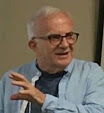Thank God for Charles Ives! Without him I couldn’t have gotten through seminary. To be more precise, without his The Unanswered Question, I might have lost my sanity altogether. I discovered this short piece of music as I was plowing through the writings of the Early Church Fathers. (Yes, they were only Fathers in those days.) Mystics and theologians battled – literally - with one another over words and even over the spelling of those words. They argued with a vitriol I had not heard since I stopped listening to radio preachers years before.
One evening in Bound Brook, NJ, as I poured over these ancient texts, unable to fathom the light within them that had animated and agitated so many, the local public radio station broadcast Ives’ piece into my study: The Unanswered Question. Fittingly, it is subtitled “A Contemplation of Something Serious.” The music struck a chord with me, if you’ll pardon the expression. It is hauntingly plaintive and inconclusive, and it has stayed with me ever since. It is a deeply humane composition.
Ives wrote The Unanswered Question in 1906 along with its companion, Central Park in the Dark in the Good Old Summer Time (subtitled “A Contemplation of Nothing Serious”). Within its simple structure there are three distinct kinds of music layered upon one another: a string chorale, an unchanging trumpet phrase and a chattering woodwind response. Ives wrote,
“The strings play pianississimo (very softly) throughout with no change in tempo. They are to represent the ‘Silence of the Druids — Who Know, See and Hear Nothing.’ The trumpet intones ‘The Perennial Question of Existence,’ and states it in the same tone of voice each time. But the hunt for ‘The Invisible Answer’ undertaken by the flutes and other human beings becomes gradually more active, faster and louder.... ‘The Fighting Answerers,’ as the time goes on and after a ‘secret conference,’ seem to realize a futility, and begin to mock ‘The Question’ — the strife is over for the moment. After they disappear, ‘The Question’ is asked for the last time, and ‘The Silences’ are heard beyond in ‘Undisturbed Solitude'."
The contrast between the words on the page and the music in my ears was startling. The apodictic certainty of the theologians paled before the “Perennial Question” put by the trumpet’s voice. I experienced great empathy with the Questioner, and a deep yearning for The Silences, but I felt the theologians were the “Fighting Answerers” whose many words lead nowhere. In that moment I gave up forever the search for all-explaining dogmatic formulations. I turned whole-heartedly toward ambiguity and embraced it. Henceforth The Question, not the Answerers, would be my guide.
Left to my own devices, I would choose to dwell within the Silence of the Druids. This is the “tacit dimension” about which the Hungarian physicist Michael Polanyi wrote so perceptively. It is the “imaginal world” of the 12th Century mystic, Ibn Arabi; it yields real knowledge though it can be accessed only through the creative imagination. It is the Tao of Lao Tzu, the Logos of St. John and the Wheel of American Indian spirituality. “We know much more than we can tell,” wrote Polanyi. And we love much more than we can know.
In later years, I came to understand that theologians also are “Questioners” first, whose “certainties” grow out of their struggles with all that is unresolved in their own hearts and in our world. I accept their words as their hypotheses, their attempts to cross the chasm.
Charles Ives was a church-going New England organist, and a Transcendentalist, but he was more. He was willing to let words fail and answers dissipate. "Vagueness,” he said, “is at times an indication of nearness to a perfect truth." Today, when too many are too certain about too much, a little vagueness would be salutary, and the Silences most welcomed













I love this essay! You have passed on an "okay-ness" with ambiguity that I myself needed to embrace, and so Ives' gift keeps on giving. Thanks for sharing, Budd.
ReplyDeleteLibby
If I'm honest Budd, I needed to be reminded that I know very little indeed. In trying to grasp the unexplainable, I explain my way around too many things, when I should let it remain unanswered. I've never heard of Charles Ives. I will listen in soon.
ReplyDeleteKim~
"Learn to rest in the ambiguity." - Pema Chodron
ReplyDelete